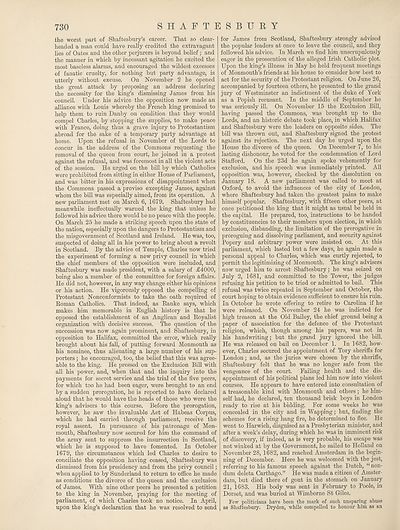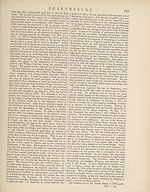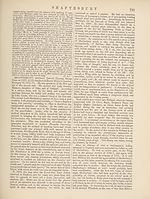Encyclopaedia Britannica > Volume 21, ROT-Siam
(740) Page 730
Download files
Complete book:
Individual page:
Thumbnail gallery: Grid view | List view

SHAFTESBURY
730
the worst part of Shaftesbury’s career. That so clear¬
headed a man could have really credited the extravagant
lies of Oates and the other perjurers is beyond belief ; and
the manner in which by incessant agitation he excited the
most baseless alarms, and encouraged the wildest excesses
of fanatic cruelty, for nothing but party advantage, is
utterly without excuse. On November 2 he opened
the great attack by proposing an address declaring
the necessity for the king’s dismissing James from his
council. Under his advice the opposition now made an
alliance with Louis whereby the French king promised to
help them to ruin Danby on condition that they would
compel Charles, by stopping the supplies, to make peace
with France, doing thus a grave injury to Protestantism
abroad for the sake of a temporary party advantage at
home. Upon the refusal in November of the Lords to
concur in the address of the Commons requesting the
removal of the queen from court, he joined in a protest
against the refusal, and was foremost in all the violent acts
of the session. He urged on the bill by which Catholics
were prohibited from sitting in either House of Parliament,
and was bitter in his expressions of disappointment when
the Commons passed a proviso excepting James, against
whom the bill was especially aimed, from its operation. A
new parliament met on March 6, 1679. Shaftesbury had
meanwhile ineffectually warned the king that unless he
followed his advice there would be no peace with the people.
On March 25 he made a striking speech upon the state of
the nation, especially upon the dangers to Protestantism and
the misgovernment of Scotland and Ireland. He was, too,
suspected of doing all in his power to bring about a revolt
in Scotland. By the advice of Temple, Charles now tried
the experiment of forming a new privy council in which
the chief members of the opposition were included, and
Shaftesbury was made president, with a salary of £4000,
being also a member of the committee for foreign affairs.
He did not, however, in any way change either his opinions
or his action. He vigorously opposed the compelling of
Protestant Nonconformists to take the< oath required of
Ptoman Catholics. That indeed, as Ranke says, which
makes him memorable in English history is that he
opposed the establishment of an Anglican and Royalist
organization with decisive success. The question of the
succession was now again prominent, and Shaftesbury, in
opposition to Halifax, committed the error, which really
brought about his fall, of putting forward Monmouth as
his nominee, thus alienating a large number of his sup¬
porters ; he encouraged, too, the belief that this was agree¬
able to the king. He pressed on the Exclusion Bill with
all his power, and, when that and the inquiry into the
payments for secret service and the trial of the five peers,
for which too he had been eager, were brought to an end
by a sudden prorogation, he is reported to have declared
aloud that he would have the heads of those who were the
king’s advisers to this course. Before the prorogation,
however, he saw the invaluable Act of Habeas Corpus,
which he had carried through parliament, receive the
royal assent. In pursuance of his patronage of Mon¬
mouth, Shaftesbury now secured for him the command of
the army sent to suppress the insurrection in Scotland,
which he is supposed to have fomented. In October
1679, the circumstances which led Charles to desire to
conciliate the opposition having ceased, Shaftesbury was
dismissed from his presidency and from the privy council;
when applied to by Sunderland to return to office he made
as conditions the divorce of the queen and the exclusion
of James. With nine other peers he presented a petition
to the king in November, praying for the meeting of
parliament, of which Charles took no notice. In April,
upon the king’s declaration that he was resolved to send
for James from Scotland, Shaftesbury strongly advised
the popular leaders at once to leave the council, and they
followed his advice. In March we find him unscrupulously
eager in the prosecution of the alleged Irish Catholic plot.
Upon the king’s illness in May he held frequent meetings
of Monmouth’s friends at his house to consider how best to
act for the security of the Protestant religion. On June 26,
accompanied by fourteen others, he presented to the grand
jury of Westminster an indictment of the duke of York
as a Popish recusant. In the middle of September he
was seriously ill. On November 15 the Exclusion Bill,
having passed the Commons, was brought up to the
Lords, and an historic debate took place, in which Halifax
and Shaftesbury were the leaders on opposite sides. The
bill was thrown out, and Shaftesbury signed the protest
against its rejection. The next day he urged upon the
House the divorce of the queen. On December 7, to his
lasting dishonour, he voted for the condemnation of Lord
Stafford. On the 23d he again spoke vehemently for
exclusion, and his speech was immediately printed. All
opposition was, however, checked by the dissolution on
January 18. A new parliament was called to meet at
Oxford, to avoid the influences of the city of London,
where Shaftesbury had taken the greatest pains to make
himself popular. Shaftesbury, with fifteen other peers, at
once petitioned the king that it might as usual be held in
the capital. He prepared, too, instructions to be handed
by constituencies to their members upon election, in which
exclusion, disbanding, the limitation of the prerogative in
proroguing and dissolving parliament, and security against
Popery and arbitrary power were insisted on. At this
parliament, which lasted but a few days, he again made a
personal appeal to Charles, which was curtly rejected, to
permit the legitimizing of Monmouth. The king’s advisers
now urged him to arrest Shaftesbury; he was seized on
July 2, 1681, and committed to the Tower, the judges
refusing his petition to be tried or admitted to bail. This
refusal was twice repeated in September and October, the
court hoping to obtain evidence sufficient to ensure his ruin.
In October he wrote offering to retire to Carolina if he
were released. On November 24 he was indicted for
high treason at the Old Bailey, the chief ground being a
paper of association for the defence of the Protestant
religion, which, though among his papers, was not in
his handwriting; but the grand jury ignored the bill.
He was released on bail on December 1. In 1682, how¬
ever, Charles secured the appointment of Tory sheriffs for
London; and, as the juries were chosen by the sheriffs,
Shaftesbury felt that he was no longer safe from the
vengeance of the court. Failing health and the dis¬
appointment of his political plans led him now into violent
courses. He appears to have entered into consultation of
a treasonable kind with Monmouth and others; he him¬
self had, he declared, ten thousand brisk boys in London
ready to rise at his bidding. For some weeks he was
concealed in the city and in Wapping; but, finding the
schemes for a rising hang fire, he determined to flee. He
went to Harwich, disguised as a Presbyterian minister, and
after a week’s delay, during which he was in imminent risk
of discovery, if indeed, as is very probable, his escape was
not winked at by the Government, he sailed to Holland on
November 28, 1682, and reached Amsterdam in the begin¬
ning of December. Here he was welcomed with the jest,
referring to his famous speech against the Dutch, “ non-
dum deleta Carthago.” He was made a citizen of Amster¬
dam, but died there of gout in the stomach on January
21, 1683. His body was sent in February to Poole, in
Dorset, and was buried at Wimborne St Giles.
Few politicians have been the mark of such unsparing abuse
as Shaftesbury. Dryden, while compelled to honour him as an
730
the worst part of Shaftesbury’s career. That so clear¬
headed a man could have really credited the extravagant
lies of Oates and the other perjurers is beyond belief ; and
the manner in which by incessant agitation he excited the
most baseless alarms, and encouraged the wildest excesses
of fanatic cruelty, for nothing but party advantage, is
utterly without excuse. On November 2 he opened
the great attack by proposing an address declaring
the necessity for the king’s dismissing James from his
council. Under his advice the opposition now made an
alliance with Louis whereby the French king promised to
help them to ruin Danby on condition that they would
compel Charles, by stopping the supplies, to make peace
with France, doing thus a grave injury to Protestantism
abroad for the sake of a temporary party advantage at
home. Upon the refusal in November of the Lords to
concur in the address of the Commons requesting the
removal of the queen from court, he joined in a protest
against the refusal, and was foremost in all the violent acts
of the session. He urged on the bill by which Catholics
were prohibited from sitting in either House of Parliament,
and was bitter in his expressions of disappointment when
the Commons passed a proviso excepting James, against
whom the bill was especially aimed, from its operation. A
new parliament met on March 6, 1679. Shaftesbury had
meanwhile ineffectually warned the king that unless he
followed his advice there would be no peace with the people.
On March 25 he made a striking speech upon the state of
the nation, especially upon the dangers to Protestantism and
the misgovernment of Scotland and Ireland. He was, too,
suspected of doing all in his power to bring about a revolt
in Scotland. By the advice of Temple, Charles now tried
the experiment of forming a new privy council in which
the chief members of the opposition were included, and
Shaftesbury was made president, with a salary of £4000,
being also a member of the committee for foreign affairs.
He did not, however, in any way change either his opinions
or his action. He vigorously opposed the compelling of
Protestant Nonconformists to take the< oath required of
Ptoman Catholics. That indeed, as Ranke says, which
makes him memorable in English history is that he
opposed the establishment of an Anglican and Royalist
organization with decisive success. The question of the
succession was now again prominent, and Shaftesbury, in
opposition to Halifax, committed the error, which really
brought about his fall, of putting forward Monmouth as
his nominee, thus alienating a large number of his sup¬
porters ; he encouraged, too, the belief that this was agree¬
able to the king. He pressed on the Exclusion Bill with
all his power, and, when that and the inquiry into the
payments for secret service and the trial of the five peers,
for which too he had been eager, were brought to an end
by a sudden prorogation, he is reported to have declared
aloud that he would have the heads of those who were the
king’s advisers to this course. Before the prorogation,
however, he saw the invaluable Act of Habeas Corpus,
which he had carried through parliament, receive the
royal assent. In pursuance of his patronage of Mon¬
mouth, Shaftesbury now secured for him the command of
the army sent to suppress the insurrection in Scotland,
which he is supposed to have fomented. In October
1679, the circumstances which led Charles to desire to
conciliate the opposition having ceased, Shaftesbury was
dismissed from his presidency and from the privy council;
when applied to by Sunderland to return to office he made
as conditions the divorce of the queen and the exclusion
of James. With nine other peers he presented a petition
to the king in November, praying for the meeting of
parliament, of which Charles took no notice. In April,
upon the king’s declaration that he was resolved to send
for James from Scotland, Shaftesbury strongly advised
the popular leaders at once to leave the council, and they
followed his advice. In March we find him unscrupulously
eager in the prosecution of the alleged Irish Catholic plot.
Upon the king’s illness in May he held frequent meetings
of Monmouth’s friends at his house to consider how best to
act for the security of the Protestant religion. On June 26,
accompanied by fourteen others, he presented to the grand
jury of Westminster an indictment of the duke of York
as a Popish recusant. In the middle of September he
was seriously ill. On November 15 the Exclusion Bill,
having passed the Commons, was brought up to the
Lords, and an historic debate took place, in which Halifax
and Shaftesbury were the leaders on opposite sides. The
bill was thrown out, and Shaftesbury signed the protest
against its rejection. The next day he urged upon the
House the divorce of the queen. On December 7, to his
lasting dishonour, he voted for the condemnation of Lord
Stafford. On the 23d he again spoke vehemently for
exclusion, and his speech was immediately printed. All
opposition was, however, checked by the dissolution on
January 18. A new parliament was called to meet at
Oxford, to avoid the influences of the city of London,
where Shaftesbury had taken the greatest pains to make
himself popular. Shaftesbury, with fifteen other peers, at
once petitioned the king that it might as usual be held in
the capital. He prepared, too, instructions to be handed
by constituencies to their members upon election, in which
exclusion, disbanding, the limitation of the prerogative in
proroguing and dissolving parliament, and security against
Popery and arbitrary power were insisted on. At this
parliament, which lasted but a few days, he again made a
personal appeal to Charles, which was curtly rejected, to
permit the legitimizing of Monmouth. The king’s advisers
now urged him to arrest Shaftesbury; he was seized on
July 2, 1681, and committed to the Tower, the judges
refusing his petition to be tried or admitted to bail. This
refusal was twice repeated in September and October, the
court hoping to obtain evidence sufficient to ensure his ruin.
In October he wrote offering to retire to Carolina if he
were released. On November 24 he was indicted for
high treason at the Old Bailey, the chief ground being a
paper of association for the defence of the Protestant
religion, which, though among his papers, was not in
his handwriting; but the grand jury ignored the bill.
He was released on bail on December 1. In 1682, how¬
ever, Charles secured the appointment of Tory sheriffs for
London; and, as the juries were chosen by the sheriffs,
Shaftesbury felt that he was no longer safe from the
vengeance of the court. Failing health and the dis¬
appointment of his political plans led him now into violent
courses. He appears to have entered into consultation of
a treasonable kind with Monmouth and others; he him¬
self had, he declared, ten thousand brisk boys in London
ready to rise at his bidding. For some weeks he was
concealed in the city and in Wapping; but, finding the
schemes for a rising hang fire, he determined to flee. He
went to Harwich, disguised as a Presbyterian minister, and
after a week’s delay, during which he was in imminent risk
of discovery, if indeed, as is very probable, his escape was
not winked at by the Government, he sailed to Holland on
November 28, 1682, and reached Amsterdam in the begin¬
ning of December. Here he was welcomed with the jest,
referring to his famous speech against the Dutch, “ non-
dum deleta Carthago.” He was made a citizen of Amster¬
dam, but died there of gout in the stomach on January
21, 1683. His body was sent in February to Poole, in
Dorset, and was buried at Wimborne St Giles.
Few politicians have been the mark of such unsparing abuse
as Shaftesbury. Dryden, while compelled to honour him as an
Set display mode to:
![]() Universal Viewer |
Universal Viewer | ![]() Mirador |
Large image | Transcription
Mirador |
Large image | Transcription
Images and transcriptions on this page, including medium image downloads, may be used under the Creative Commons Attribution 4.0 International Licence unless otherwise stated. ![]()
| Encyclopaedia Britannica > Encyclopaedia Britannica > Volume 21, ROT-Siam > (740) Page 730 |
|---|
| Permanent URL | https://digital.nls.uk/193636899 |
|---|
| Attribution and copyright: |
|
|---|---|
| Shelfmark | EB.17 |
|---|---|
| Description | Ten editions of 'Encyclopaedia Britannica', issued from 1768-1903, in 231 volumes. Originally issued in 100 weekly parts (3 volumes) between 1768 and 1771 by publishers: Colin Macfarquhar and Andrew Bell (Edinburgh); editor: William Smellie: engraver: Andrew Bell. Expanded editions in the 19th century featured more volumes and contributions from leading experts in their fields. Managed and published in Edinburgh up to the 9th edition (25 volumes, from 1875-1889); the 10th edition (1902-1903) re-issued the 9th edition, with 11 supplementary volumes. |
|---|---|
| Additional NLS resources: |
|

